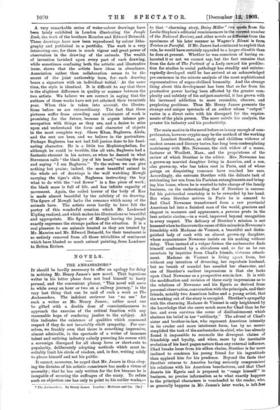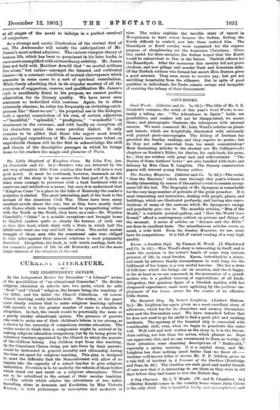NOVELS.
THE AMBASSADORS.* IT should be hardly necessary to offer an apology for delay in noticing Mr. Henry James's new novel. That ihgehious writer in his latter phase does nOt lend himself' to hasty perusal, and the convenient phrase, "This iiovei will serve to while away an hour or two on a railway journey," is the very last thing that can be said of such a work as The Ambassador& The indolent reviewer has "no use" for such a writer as Mr. Henry James ;. ratter must one be gifted with a double dose 44 conscientiousness to approach the exercise of the critical hind:Ion with any reasonable hope of rendering justice to tlie subject. All this indicates the existence of qualities which ..c.oni wand respect if they do not invariably elicit sympathy. „For our- selves, we frankly own that there is something impressive, almost admirable, in the spectacle of a writer of immense talent and untiring industry calmly pursuing his course with a sovereign disregard for all cheap lures or . short-cuts to popularity, deliberately adopting methods which must in- evitably limit his circle of readers, and, in fine, writing solely to please himself and not his public.
It cannot, moreover, be urged that Mr. James in thiis obey- ing the dictates of his artistic conscience hae. Made a.virtue of necessity ; that he has only written for the few. because he is incapable of securing the suffrages of the many. To refute such an objection one has only to point to his earlier works,— • The Ambassadors. By Henry James. London Methuen and Co. [438.1
to that "charming story, Daisy Miller" (we quote from Sir Leslie Stephen's editorial reminiscences in the current number of the National Review), and other novels as different from the specimens of his later manner as Wagner's Rienzi is from Tristan or Parsifal. If Mr. James had continued to exploit that vein, he would have certainly appealed to a larger elienale than he does at present. Whether he was conscious of having ex- hausted it or not we cannot say, but the fact remains that from the date of The Portrait of a Lady onward his predilec- tion for studies in social pathology has steadily and uninter- ruptedly developed uhtll he has arrived at an acknowledged pre-eminence in the minute analysis of the most sophisticated. representatives of supra-civilised humanity. And the strange thing about this development has been that so far from his productive power having been affected by the greater com- plexity and subtlety of his subject-material, it has grown with his increased addiction to more recondite, obscure, and perplexing problems. Thus Mr. Henry James presents the strange and unique spectacle of an author whose " output " varies in a direct ratio with his disregard for the require- ments of the plain person. The more subtle his analysis, the greater his industry and his productivity.
The main motive in the novel before us is easy enough of com- prehension, however cryptic may be the method of the working out. Lambert Strether, an elderly and childless widower of modest means and literary tastes, has long been contemplating matrimony with Mrs. Newsome, the rich widow of a mann. facturer at Woollett, Mass., and the proprietress of the review of which Strether is the editor. Mrs. Newsome has a grown-up married daughter living in America, and a son, also grown-up, who has taken root in Paris, and of whose goings on disquieting rumours have reached her ears. Accordingly, she entrusts Strether with the delicate task of extricating her son from his Parisian entanglements and bring- ing him home, where he is wanted to take charge of the family business, on the understanding that if Strether is success- ful his patriarchal courtship is to be rewarded by her hand. But when Strether arrives in Paris he is amazed to find Chad Newsome transformed from a raw provincial American lad into a finished man of the world, gracious and elegant in manners and appearance, a persona grata in the best artistic circles,—in a word, improved beyond recognition in every respect. The delicacy of Strether's mission is not lessened when he discovers the cause of this miracle is Newsome's friendship with Madame-de Vionnet, a beautiful and distin- guished lady of rank with an almost grown-up daughter, whose acquaintance Newsome insists on his making without delay. Thus instead of a vulgar liaison the ambassador finds himself confronted by a chivalrous and, so far as he can ascertain by inquiries from Chad's friends, virtuous attach- ment. Madame de Vionnet is living apart from, but without any intention of divorcing, her reprobate husband, but no breath of scandal has assailed her character, and one of Strether's earliest impressions is that she looks upon Chad Newsome as a prospective son-in-law. It is with the modification and revision of these early impressions as to the relations of Newsome and his Egeria as derived from personal observation, conversation with the principals, and their friends, notably two American ladies and a young artist, that the working out of the story is occupied. Strether's sympathy with the charming Madame de Vionnet is only heightened by the knowledge that she cares much more for Chad than he for her, and even survives the scene of disillusionment which shatters his belief in her "sublimity." The advent of Chad's sister and brother-in-law, who represent American intensity in its cruder and more intolerant form, has by no means simplified the task of the ambassador-in-chief, who has already found it impossible to reconcile the divergent claims of friendship and loyalty, and when, more by the inevitable evolution of his hard pagan nature than any external influence, Chad breaks loose from his silken chains, Strether is far more inclined to condemn his young friend for his ingratitude than applaud him for his prudence. Beyond the facts that Strether returns to America having seriously compromised his relations with his American benefactress, and that Chad deserts his Egeria and is prepared to "range himself" in business, no precise information as to what exactly happens to the principal characters is vouchsafed to the reader, who, as generally happens in Mr. James's later works, is left free
at all stages of the novel to indulge in a perfect carnival of conjecture.
As a strange and exotic illustration" Of the eternal duel of sex, The Ambassador will satisfy the anticipations of Mr. James's most ardent admirers. The curious vampire theory of human life, which has been so prominent in his later books, is once more exemplified with extraordinary subtlety. Mr. James does not hold with Matthew Arnold that "we mortal millions live alone," but rather—amongst the leisured and cultivated classes—in a constant condition of mutual clairvoyance which amounts in some cases to a sort of spiritual cannibalism. While freely admitting that in its singular mastery of all the resources of suggestion, reserve, and qualification Mr. James's style is excellently fitted to his pmpose, we cannot profess admiration for its literary quality. We have never seen sentences so bedevilled with commas. Again, he is often extremely obscure; he relies too frequently on irritating catch- phrases like "there we are " ; his perpetual use in the dialogue, with a special connotation of his own, of certain adjectives —" beautiful," "splendid," "prodigious," "wonderful "—is wearisome in the extreme; and with hardly an exception all his characters speak the same peculiar dialect. It only remains to be added that those who regret most keenly the prodigal expenditure of Hr. James's immense talent on unprofitable themes will be the first to acknowledge the skill and charm of the descriptive passages in which he brings home to his readers the magic and glamour of Paris.



























































 Previous page
Previous page